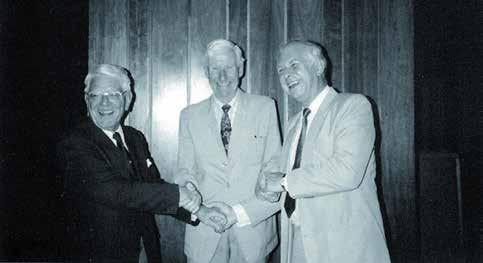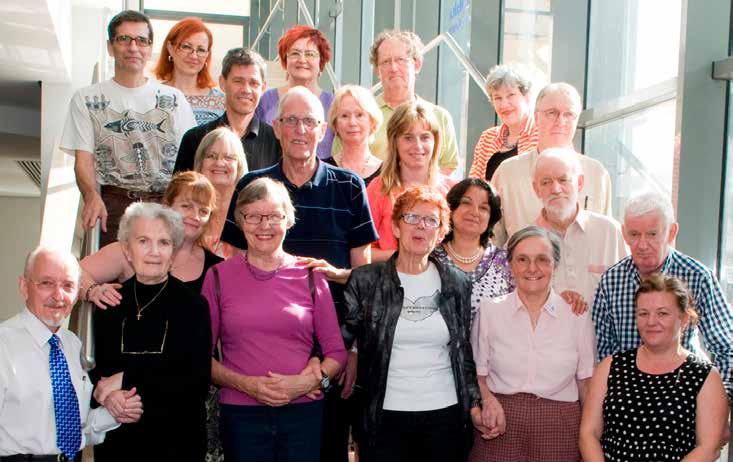
7 minute read
Jean Georges looks back on his 24 years as Executive Director of Alzheimer Europe
On 1 November 1996, Jean Georges joined Alzheimer Europe as its first Executive Director. In this interview, he looks back at some of the key achievements of the organisation and its plans for the coming years.
This year marks 30 years of Alzheimer Europe – what are your reflections on this anniversary?
Advertisement
Looking back on the history of Alzheimer Europe, I want to start by paying tribute to the vision of the founders of our European movement: Michael Coote from Ireland, Henk ter Haar from the Netherlands and Franz Baro from Belgium felt that their associations could both learn from other organisations and share their innovative projects and activities with others.
They convinced the representatives of 106 associations from six countries (Belgium, Finland, Ireland, Netherlands, Poland, and Spain) to meet for the first time on 3 September 1990 and to formally launch Alzheimer Europe. At this meeting, they adopted the following statement “Because we are all satisfied that we will benefit from European co-operation, and together can put more pressure on the European Council, Commission, Parliament and other national and supranational organisations, we have decided to form a European Alzheimer organisation.” Co-operation and lobbying European institutions remain important priorities of Alzheimer Europe to this day.
I had the privilege to meet all three of the founding fathers and I was happy to hear how proud they were of the increasing recognition and scope of the association which they created.
Alzheimer Europe’s role has evolved and now looks significantly different to its earlier years – can you tell us more about how and why this change occurred?
I am truly proud to have been able to lead Alzheimer Europe over the past 24 years and accompany and, sometimes, instigate the many changes that the organisation has undergone.

Jean Georges
Fundamentally, some of the key roles and priorities of the organisation remain unchanged. Alzheimer Europe is, above all, the umbrella organisation of national Alzheimer’s associations and their support continues to be an important role. The membership of the association has of course grown from the 10 founding organisations from 9 countries to 39 associations from 35 countries.
Similarly, we continue to raise awareness of dementia, represent the interests of people with dementia and their carers and lobby the European institutions for a greater recognition of dementia as a public health priority. However, the importance given to these priorities has changed considerably.
At the beginning of Alzheimer Europe, the focus was predominantly on supporting national members, helping them setting up websites and providing them with material, such as the Care manual or the Children’s book, which could help them in providing advice to carers and much needed information on Alzheimer’s disease.
As the member associations continued to grow themselves and as the awareness of Alzheimer’s disease increased, Alzheimer Europe started to focus more on its policy work and in 2006, we adopted our Paris Declaration with the political priorities of the European dementia movement. This was followed by the development of our European
The first European Working Group of People with Dementia at the 2013 Annual Conference in Malta

Alzheimer’s Alliance with Members of the of people with dementia is heard in all our European Parliament and the recent crea- activities and projects. The Chair of the group tion of our European Group of Governmental also sits on the Board of Alzheimer Europe Experts on Dementia with representatives of with full voting rights and we have benefited national health ministries. hugely from the input and advice of the chairAnother key change for the organisation was and Helen Rochford-Brennan from Ireland, the inclusion and involvement of people with but equally from all the members of the Eurodementia. Alzheimer Europe and most of pean Working Group. our member organisations were set up and run by carers of people with dementia. Over persons to date, Helga Rohra from Germany the years, the diagnosis of Alzheimer’s disease and other types of dementia was being made at an earlier stage. As more people with dementia were able to speak out and advocate for their own needs, Alzheimer Europe responded by identifying ways in which their “Over the years, Alzheimer Europe has become a recognised and valued partner at a European level in the views could be included in the projects and advocacy and research worlds. the governance of the association. With the I am particularly proud of how creation of the European Working Group of People with Dementia in 2012, Alzheimer we have been able to adapt and Europe was able to ensure that the voice change.” A final and more recent change has been the involvement of Alzheimer Europe in research. From 2006 to 2008, Alzheimer Europe coordinated the EuroCoDe (European Collaboration on Dementia) project which was funded by the EU health programme and which resulted in reports and recommendations on the prevalence, treatment, prevention and psychosocial support of dementia in Europe, as well as an overview and comparison of social support systems. In turn, this led to the very close collaboration with INTERDEM, our sister organisation of researchers involved in psychosocial research. Even more recently, Alzheimer Europe has started to partner with EU research projects funded by Horizon2020, the Innovative Medicines Initiative (IMI) and the Joint Programme for Neurodegenerative Diseases Research (JPND) where we contribute to and sometimes lead the dissemination, ethics and patient and public involvement activities.
What achievements are you most proud of during your time as Executive Director?
Over the years, Alzheimer Europe has become a recognised and valued partner at a European level in the advocacy and research worlds. I am particularly proud of how we have been able to adapt and change as mentioned above.

When it comes to the involvement of people with dementia, Alzheimer Europe was able to be a pioneer and I am really delighted to see how many of our national member organisations have followed our example of setting up working groups of people with dementia to advise the associations and help them in their advocacy work towards national policy makers and governments. Helga Rohra receives plaque marking her six years with the European Working Group of People with Dementia It has been a real privilege to work alongside and with the members of our European Working Group of People with Dementia who truly transformed the way in which our organisation operates. I am also proud of how Alzheimer Europe has “I am also proud of how Alzheimer Europe has been able to make dementia a European priority thanks national governments to ensure that dementia remains a priority despite the ongoing pandemic. Alzheimer Europe was able to support these developments by developing a COVID-19 resource centre on the website and organising been able to make dementia a European priority thanks to coordinated campaigns at to coordinated campaigns at meetings with national health ministry officials and with members to allow an exchange European level and, together with its mem- European level and, together with of information and good practices. bers, at national level. When we adopted the its members, at national level.” Paris Declaration in 2006, only France had The organisation will soon set out its five a very modest national Alzheimer’s plan. year strategic plan – what can we expect Over the years though, the number of coun- been in awe at how national organisations the future focus of the organisation to be? tries with national dementia strategies has have risen to the challenge and adapted increased significantly. their services to the new situation. They have For the coming years, I do not see a revolution, provided counselling and support via telecon- but rather an evolution of the five strategic What have been the biggest challenges for ferences, used new technologies to connect priorities, as I believe we will need to conthe organisation and how have these been people with dementia with each other and tinue to give a voice to people with dementia, overcome? with their families, provided information make dementia a European priority, promote on the pandemic in easy to understand lan- a human-rights based approach to dementia, The ongoing COVID-19 pandemic is undoubt- guage specifically targeted at people with support research and strengthen the Euroedly one of the biggest challenges which dementia, adapted routines in day care and pean Dementia Movement. I look forward Alzheimer Europe and our national member nursing homes to protect residents and cli- to continuing to lead Alzheimer Europe in organisations have had to face. I have truly ents and continued their lobbying towards advancing these aims.










